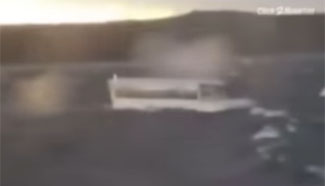WASHINGTON, July 30 (Xinhua) -- NASA's newest planet-hunting satellite began operations last week and is expected to send back its first series of data in August, the U.S. space agency said in a statement Saturday.
"I'm thrilled that our new planet hunter mission is ready to start scouring our solar system's neighborhood for new worlds," Paul Hertz, director of NASA's astrophysics division, said.
The Transiting Exoplanet Survey Satellite (TESS), launched on April 18, is NASA's latest satellite to hunt for planets outside our solar system. It will monitor the brightness of more than 200,000 stars over a period of two years, eyeing temporary drops in brightness caused by planetary transits.
The primary goal of TESS is to find exoplanets that can be characterized with ground-based follow-up surveys.
Occupying a never-before-used orbit high above Earth that takes half of the moon's orbital period, TESS will study over 90 percent of the sky and transmit observations back to Earth every 13.5 days.
The mission is under NASA's Astrophysics Explorer program, led and operated by the Massachusetts Institute of Technology. The Kepler space telescope discovered over 2,000 confirmed exoplanets since its launch in 2009. As a follow-up, TESS is expected to match or even exceed the number.
Focusing on stars that are 30 to 100 times brighter than those Kepler has surveyed, TESS will also pave the way for further observations with NASA's upcoming James Webb space telescope.













